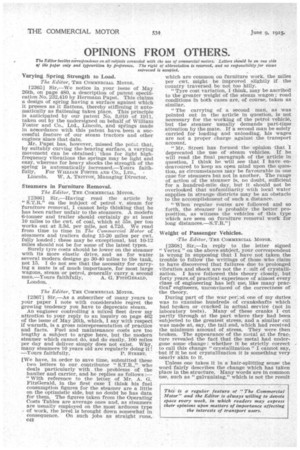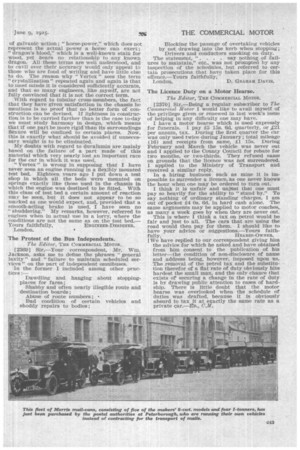OPINIONS FROM OTHERS.
Page 26

Page 27

If you've noticed an error in this article please click here to report it so we can fix it.
The Editor invites co—rresfiondenee on all subjects connected with the use of commercial motors. Letters should be on one side of the paper only and typewritten by preference. The right of abbreviation is reserved, and no responsibility for views
exAressed is accepted,
Varying Spring Strength to Load.
The Editor, THE COMMERCIAL Moron,.
[2365] Sir,—We notice in your issue of May 26th, on page 480, a description of patent specification No. 232,410 by Hermann Papst. This claims a design of spring having a surface against which it presses as it flattens, thereby stiffening it automatically as flattening takes place. This principle is anticipated by our patent No. 3,010 of 1911, taken out by the undersigned on behalf of William Foster and Co., Ltd. Lincoln, and springs made in accordance with this patent have. been a successful feature of our steam tractors and other engines since that date.
Mr. Papst has, however, missed the point that, by suitably curving the bearing surface, a varying movement can be obtained; 'thus for light highfrequency vibrations the springs may be light and easy, whereas for heavy shocks the strength of the spring is automatically increased.—Yours faith fully, For WILLIAM FOSTER AND CO., LTD., Lincoln. W. A. TRITTON, Managing Director.
Steamers in Furniture Removal.
The Editor, THE COMMERCIAL MOTOR.
[2366] Sir,—Having read the article by " S.T.R." on the Subject of petrol v. steam for furniture removal, I cannot help thinking that he has been rather unfair to the steamers. A modetn 6-tonner and trailer should certainly go at least 10 miles to the cwt. of coal, which at 55s, per ton works out at 3.3d. per mile, not 4.72d. We read from time to time in The Commercial Motor of steamers and trailers doing 15-20 miles per cwt. fully loaded ; these may be exceptional, but 10-12 miles should not be for some of the latest types.
Surely tyre costs should be lower on the steamer with its more elastic drive, and as for water several modern designs go 30-40 miles to the tank, not 15. I do not see that the necessity for carrying a mate is of much importance, for most large wagons, steam or petrol, generally carry a second man.—Yours faithfully, A. G. FITZGERALD, London.
The Editor, Tin COMMERCIAL MOTOR, [2367] Sir,—As a subscriber of many years to your paper I note with considerable regret the growing tendency you have to deprecate steam.
An engineer controlling a mixed fleet drew my attention to your reply to an inquiry on page 462 of the issue of May 26th, which, I say with respect if warmth, is a gross misrepresentation of practice and facts. Fuel and maintenance costs are too lengthy a subject to argue here, but the modern steamer which cannot do, and do ea_sily, 100 miles per day and deliver, simply does not exist. Why, many steamers 10 years old are regularly doing it —Yours faithfully, P. STREET.
[We have, in order to save time, submitted these two letters to our contributor " S.T.R.," who deals particularly with the problems of the haulier and carrier, and he replies as follows :— "With reference to the letter. of Mr. A. G. FitzGerald, in the first case I think his fuel consumption figures for the steamer are a little on the optimistic side, but no doubt he has data for them. The figures taken from the Operating Costs Tables are average ones and, as steamers are usually employed on the most arduous type of work, the level is brought down somewhat In consequence. On such jobs as straight runs, c42 which are common on furniture work, the miles per cwt. might be improved slightly if the country traversed be not too hilly. "Tyre cost variation, I think, may be ascribed to the greater weight of the steam wagon ; road conditions in both cases are, of course, taken as similar.
"The carrying of a second man, as was pointed out in the article in question, is not necessary for the working of the petrol vehicle, but the steamer usually demands part-time attention by the mate. If a second man be solely carried for loading and unloading, his wages are not a proper charge against the transport account.
"Mr. Street has formed the opinion that I deprecated the use of steam vehicles. If he will read the final paragraph of the article in question, I think he will see that I have endeavoured to keep an open mind upon the question, as circumstances may be favourable in one case for steamers but not in another. The range of action of the steamer is, no doubt, sufficient for a hundred-mile day, but it should not be overlooked that unfamiliarity with local water supplies in strange districts may be an obstacle to the accomplishment of such a distance.
"When regular routes are followed and so forth, the steamer is probably the better proposition, as witness the vehicles of this type which are seen on furniture removal work for long distances.—S.T.R."]
Weight of Passenger Vehicles.
,The Editor, THE COMMERCIAL MOTOR, [2368] Sir,—In reply to the letter signed " Vertex " on the above subject, your correspondent is wrong in supposing that I have not taken the trouble to follow the writings of those who claim to have discovered that failures due to prolonged vibration and shock are not the r_ ult of crystallization. I have followed this theory closely, but forty years of practical experience of almost every class of engineering has left me like many practicar engineers, unconvinced of the correctness of the theory.
During part of the war per:A one of my duties was to examine hundreds of crankshafts which had broken or cracked in actual service (not in laboratory tests). Many of these cranks I cut partly through at the part where they had been subjected to the greatest stress, and a similar cut was made at, say, the tail end, which had received the minimum amount of stress. They were then broken. The appearance of the metal at the fracture revealed the fact that the metal had undergone some change : whether it be strictly correct to call this change " crystallization" I cannot say, but if it be not crystallization it is something very nearly akin to it.
Unless one takes it in a hair-splitting sense the word fairly describes the change which has taken place in the structure. Many words are in common use, such as "galvanizing," which is not the result of galvanic action; "horse-power,' which does not represent the actual power a horse can exert; "dragon's blood," which is a well-known stain for wood, yet bears no relationship to any known dragon. All these terms are well understood, and to cavil over their accuracy would only appeal to those who are fond of writing and have little else to do. The reason why "Vertex " sees the term "crystallization" repeated again and again is that to most minds it is considered sufficiently accurate, and that so many engineers, like myself, are not fully convinced that it is not the correct term.
With regard to tubular cross-members, the fact that they have given satisfaction in the chassis he mentions is no proof that no better form of construction can be devised. If lightness in construction is to be carried farther than is the case to-day we must study harmony in design, which means that if one part be more rigid than its surroundings flexure will be confined to certain places. Now, this is exactly what should be avoided if unnecessary weight is to be eliminated.
My doubts with regard to duralumin are mainly based on the failure of a part made of this material which very nearly lost an important race for the car in which it was used.
" Vertex " is wrong in supposing that I have never seen an engine running in a flexibly mounted test bed. Eighteen years ago I put down a test shop in which all the beds were mounted on springs exactly like those used in the chassis in which the engine was destined to be fitted. With this class of test bed a certain amount of reaction may be seen, but it does not appear to be so marked as one would expect, and, provided that a smooth-acting brake is used, I have seen no
shuddering." My remarks, however, referred to engines when in actual use in a lorry, where the conditions are not the same as on the test bed.—
Yours faithfully, ENGINEER-DESIGNER. London,
The Protest of the Bus Independents.
The Editor, THE COMMERCIAL MOTOR.
[2369] Sir,—Your correspondent, Mr. Wm. Jackson, asks me to define the phrases "general laxity" and "failure to maintain scheduled services" on the part of independent omnibuses.
In the former I included among other practices:— Dawdling and hanging about stoppingplaces for fares; Shabby and often nearly illegible route and destination boards; Abuse of route numbers; Bad condition of certain vehicles and shoddy repairs to bodies ;
Blocking the passage of overtaking vehicles by not drawing into the kerb when stopping; Drivers and conductors smoking on duty. The statement, " . . . . say nothing of failures to maintain," etc., was not prompted by any inspection of the schedules, but referred to certain prosecutions that have taken place for this offence.—Yours faithfully, •
London. D. GRAHAM DAVIS.
The Licence Duty on a Motor Hearse.
The Editor, TnE CommERCIAL MOTOR.
[23701 Sir,—BeIng a regular subscriber to The Commercial Motor I would like to avail myself of the privilege given or renewed in last week's issue of helping in any difficulty one may have.
I have a motor hearse which is used expressly for funerals. I pay £5 15s. 6d. quarterly, or 121 per annum, tax. During the first quarter the car was only used twice during January ; total mileage (16) and receipts from same, £1 15s. During February and March the vehicle was never out and I applied td the County Council for rebate for two months, or two-thirds. They refused same on grounds that the licence was not surrendered. I applied to the Ministry of Transport and received a similar reply.
In a hiring business such as mine it is impossible to surrender a licence, as one never knows the hour when one may be ordered to turn out.
I think it is unfair and unjust that one must pay so heavily for the ability to "stand by." To say nothing of ordinary standing charges, I am out of pocket Os. 6d. in hard cash alone. The same arguments may he applied to motor coaches, as many a week goes by when they are never out. This is where I think a tax on petrol would be fair and just to all. The cars that are using the road would then pay for them. I should like to have your advice or suggestions.—Yours HEARSE-OWNER. [We have replied to our correspondent giving him
the advice for which he asked and have obtained from him consent to the publication of his letter—the condition of non-disclosure of name and address being, however, imposed upon us. The removal of the petrol tax and the substitution therefor of a fiat rate of duty obviously hits hardest the small man, and the only chance that exists of' securing a change in the rate of duty is by drawing public attention to cases of hardship. There is little doubt that the motor hearse was overlooked when the schedule of duties was drafted, because it is obviously absurd to tax it at exactly the same rate as a private car.—En.,






























